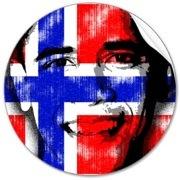
Over the last few days a consensus has formed, on both the left and the right, that awarding the Nobel Peace Prize to Barack Obama was too much, too soon. Even the President’s warmest admirers were embarrassed by the honor’s prematurity, while his domestic critics seized on it much the way they had reacted to the international adulation Obama received as a candidate, when, for example, he brought more than 200,000 people onto the streets of Berlin: they saw it as evidence both of the wide-eyed, teenybopper crush foreigners have on Obama and, somehow, of the President’s own hubris. But on closer examination, the award is not the stunning surprise it first seemed. And, at least from the point of view of those who gave it, it’s not so daft either.
Such is the mystique attached to all things Nobel: it is easy to imagine the Peace Prize is barely touched by human hand, that a winner emerges by a process of semi-divine conclave above the fray of grubby politics. That’s certainly how the guardians of the prize’s image—who disclose only the skimpiest details of their methods—like it to be seen. But the reality is that those who choose do not occupy some lofty realm beyond mere mortals and their affairs. On the contrary, the Peace Prize is chosen by politicians—and politicians from a single, small country at that.
They are all former members of the Norwegian storting, parliamentarians representing a national population half the size of London. (Oddly, Alfred Nobel’s will specified that, while the rest of the awards be handed out in Stockholm, the Peace Prize be outsourced to Oslo.) In the chair this year, for the first time, was the former prime minister, Thorbjørn Jagland—and he was widely understood to want to make a splash on his debut. That a politician would want to make headlines should not have surprised anyone.
The makeup of the rest of the panel should have similarly prepared us for the eventual outcome. The five-strong committee reflects the parliamentary balance of the storting, meaning that Jagland was joined by a fellow Labour Party member and a representative of the Socialist Left Party—giving the center-left an automatic majority. The remaining two panelists include a conservative widely admired, especially by feminists, for mounting a boardroom coup against an oil company, and a populist from the Progress Party. Whatever their Norwegian affiliations, all five would, if transplanted to the US, belong on the liberal end of the political spectrum: the center of gravity in Nordic politics is simply much further to the left than it is in the US.
Besides, on foreign policy there is a Norwegian consensus. It favors multilateralism, yearns for nuclear disarmament, and believes in international institutions, revering the United Nations above all. This is not sandal-wearing Scandinavian altruism but hardheaded self-interest. Norway is a small nation that sits outside the European Union. Its best shot at influence is through bodies such as the UN. Plenty in Oslo speculate that Obama’s performance in New York last month—chairing the Security Council and using that body as the vehicle for his disarmament ambitions—was what clinched it for the Nobel judges.
There were two other clues: Jimmy Carter and Al Gore. Both were winners in the Bush era, in 2002 and 2007 respectively. What those choices, and the naming of Obama, suggest is that those on the US right who, in recent years, detected a rising anti-Americanism in Europe misread the signs. What, in fact, they were seeing was a deep anti-Bushism—a sentiment that was more widely felt around the world than many Americans may realize. Norway has long been avowedly pro-American, particularly proud of its membership in NATO. What the awards to Carter, Gore and now Obama reveal is how deep that pent-up affection for the US went. Like much of the rest of the world, Norway was waiting for the chance to be pro-American once more. Obama’s inauguration gave them their cue.
Was it so dumb? Jagland wouldn’t say so. Oslo elites fret that Norway has lost the access it once had in Washington, back in the halcyon days of the early 1990s when the path to Israeli-Palestinian peace seemed to run through the Norwegian capital. The break came when Norway opposed the Iraq war. Since then it watched as its rival, Denmark, a cheerleader for and ally in the Iraq invasion, got ever cosier to the White House: a Dane now serves as NATO secretary-general. Is it possible that Jagland wanted to send Obama a bouquet on behalf of his country, reminding the US of the good times they once had together?
Even if that is fanciful, and even if the initial response has been unfriendly, the Nobel panel might yet see fruit for their labors. They stress that the Peace Prize is not only a reward for past effort, but also performs an exhortatory function. “We felt it was right to strengthen him as much as we can,” Geir Lundestad, the secretary of the Norwegian Nobel Committee, told Gwladys Fouché, the Guardian’s correspondent in Oslo.
Advertisement
Obama himself picked up on this notion when he noted that the honor has “been used as a means to give momentum to a set of causes.” They may have tied his hands—making it harder for the President, as a Peace Prize laureate, to take military action against Iran or escalate in Afghanistan. They will hope, at the very least, to bind him into further action on nuclear arms and to keep faith with the UN.
Of course, in the end, the award may prove to be ill-judged. But given those who hand it out, we should probably have found it a tad less surprising than we did.
Jonathan Freedland is a Guardian editorial page columnist whose work appears online at http://www.guardian.co.uk/commentisfree.


